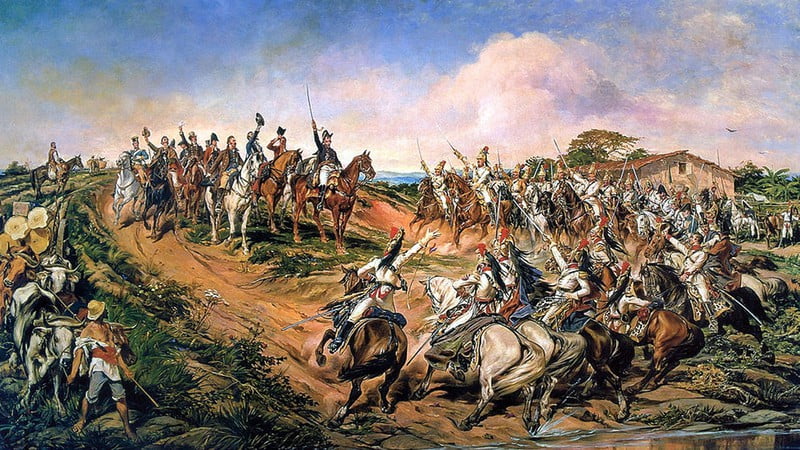Remember the Borg Queen? A “hive mind” is shared opinions that, for most instances, can be seen as its own entity, a collective intelligence showing patterns of coherent behaviour. Call it groupthink or swarm intelligence: it’s its own thing, in spite of those that constitute it.
In Tolstoi’s “War and Peace” you’ll find this idea that History unrolls in many theatrical stages at once, but at different levels. History is made by specific persons, living their own uniqueness against the uniqueness of the times they were dealt. However, History is also made in rather conceptual stages where the characters are not persons, but groups of persons, tribes, nations or even ideas, fears and hopes. The latter characters are much more powerful, determined and ruthless. Deep down, History is always about power struggles between its characters.

“O grito do Ipiranga” by Pedro Américo, circa 1888. “Ipiranga’s cry for liberty” portrays the inevitable emancipation of Brazil in 1822, when it was still part of the Portuguese empire mainly because of the status quo. It had outgrown an antiquated Portugal, which had been devastated by the Napoleonic and Civil wars.
The term “Great Resignation” was coined by Anthony Klotz, an organisational psychologist and professor at Texas A&M University, referring to the wave of people quitting their jobs during the coronavirus pandemic. What Klotz didn’t predict was that it would go on even after the pandemic. It is and it will.
My take is that the pandemic had little to do with it. There was a primordial soup awaiting it, marinating in the hive mind of the workforce.
The pandemic was just a trigger, an electrostatic discharge on that primordial soup which set in motion an unstoppable chain reaction.
The primordial soup
What motivates the hive mind to the Great Resignation can’t be pinned down to the one cause, it is a number of intertwined factors that will greatly lose their bearings at the sight of the slightest reductionism [ – said he, just before embarking in a reductionistic orgy]. Here’s a few of what I think are the genetic strains of this phenomenon:
Life is short
Arguably the biggest number of people since we’ve started wondering about life now believe this is it, your one and only ticket to consciousness. Even if you don’t, the general consensus clearly is that one should play safe and enjoy the most out of this ride. The pandemic reminded us of our own frailness. Some of us—lucky enough to be living in fairy tale societies—were given a taste of real fear for our loved ones for the first time. Many have lost someone, either in direct or indirect consequence of the virus.
Freedom
Being dependent on a salary for a dignified living, specially when disregarding your actual contribution to society, can be a form a slavery. People who are tired, sleep-deprived, half-living around a mission that isn’t theirs, but imposed by those who pay their salary, can’t really be seen as free, nor can their full potential be met.
Remainders of the industrial revolution
Sorry, but not sorry—most companies are still archaic relics of human organisation, soulless machines with deterministic procedures that can’t be helped, even if their lives depended on it (which they often do). If this wasn’t obvious, it became so as soon as circumstances forced us to deal with remote work, and trust and psychological security came into play.
Climate change
The growing concern with the state of affairs of our shared (and still only) home, has opened the doors to a return to roots for many. Reducing our footprint, walking towards self-reliance, reconnecting with nature does not go well with 9-to-5, 40 hours a week, daily commuting jobs.
Technological advances
On one hand, we have the very real possibility of remote work which, together with other marvellous tools, allows us to achieve unprecedented levels of creative productivity.
On the other hand, we have the democratisation of skills. Modern programming languages are one great example of this. One can now easily self-teach a new programming language that allows for building incredibly useful and complex solutions, totally independent of the traditional academic sources of knowledge.
Decentralisation of everything
Distributed teams and the globalisation of talent. Some avant-garde companies are completely decentralised. The internet, the cloud, blockchain, cryptocurrency. New business models that rely on increasingly smaller atoms. Uber, Airbnb, Etsy…
Purpose
An overly polarised society where it seems the only thing that brings people together is their crave for the next brand new shiny gadget, at a premium from last year’s. These gadgets, more often than not, work at silicon-based speeds, at which they constantly require our dizzy carbon-based attention. Even with all the great advancements we’ve been exponentially making, it seems like it all boils down to the EBITDA. Furthermore, there’s a dark shadow in the horizon: some incredibly smart people are predicting there is an AI little thingy coming soon that may even take whatever purpose we still had in being a cog on this for-profit mechanism.
And then came the pandemic…
Careers can be an addictive game. Success feels good, but each new success gives you a smidge less kick for less time. What was a success in the beginning of your career now feels like a failure. It’s a ladder supposed to climb up, not down, and failures become dreadful.
This is a key ingredient in the primordial soup: slowly we’ve built our lives around our careers.
The pandemic forced us to face ourselves: the real meaning of our careers in the grand scheme of things is, at best, not guaranteed.
Typically, what is referred most often is how people started working more hours when locked at home because of the pandemic. How it was painfully hard to have kids around while worried about maintaining acceptable levels of productivity. How we were imprisoned at home, without boundaries for work. How layoffs and overall economic instability made us fear for our jobs and how we were supposed to pick up the additional workload of those who left. How, during those darkest lockdown hours, that “How are you?” on Slack was just an opening for “When will that report be ready?”. And, of course, how all of this affected mental health and forged a one way path to burnout.
All that is quite true, but I believe it’s utterly missing the point.
What happened was that the pandemic hacked the servers of this addictive game that is our career.
For a short period of time, we were no longer able to login to that game. All those achievements, hard work, hours and days, months and years of blood, sweat and tears locked away indefinitely. Much like addicts before such a loss, we went through all phases of grief. Denial, anger, bargaining, depression…
Now that the ransomware has been paid off and the servers are getting back up, while many people are reaching the acceptance phase of grief, we’re witnessing players of this game noticing the addiction is now completely out of their systems and deleting their accounts for good. Others will play again, but going forward only in Carpe Diem mode, just for fun. Some of us will surely get the old kicks again and proceed as if nothing happened.
But everything changed.
We now know it’s ok to just say “F*ck it!”. The cry for Liberty is echoing in the battlefield.
What does this mean moving forward?
I’m fond of the term “The Great Reset”: the great reimagination of work, of which tech talent and companies will probably lead. Don’t be fooled: the cleft is already unavoidable. The nature of work, as was, makes no sense moving forward.
Talent
Purpose will play a central role in career decisions. Talent will want a much bigger take on their company’s destiny. Tech talent in particular now know that in a job interview it’s them interviewing the company, at least as much as the other way around. Life-work balance is sacred and they won’t be afraid to take all measures to protect it. It’s quite simple actually, if you think of it: talent will be happy if they’re happy, regardless of all the BS that was the old routine of the Talent/Company power play. Which takes us to companies.
Companies
Flexibility is key for talent attraction and retention. Embrace remote-work, hybrid models, true asynchronous productivity. Companies will realise that what they’ve been saying all along—“we are as good as our people and they are the company”—is actually true. There’s a moral contract between an individual and an organisation that can be truly transformative, profitable and mutually beneficial. These are the only kinds of relationships that will take our species’ endeavours to new realms of serendipity.
I’ve just blindly scrolled through to see where all this babbling was going
The Great Resignation isn’t really just a paragraph History will have written under the chapter “The COVID19 Pandemic”. It’ll probably be under the chapter “The Great Reimagination of Work”, which will explain how mankind was able to pick up the best of our technological breakthroughs and lessons from past failures to change the paradigm of work. Hopefully, it’ll tell the tale of how that new paradigm put work in service of our individual happiness and collective survival.
Related articles: The new era of work: what employers need to know | 5 major HR tech trends to watch for in 2022






0 Comments